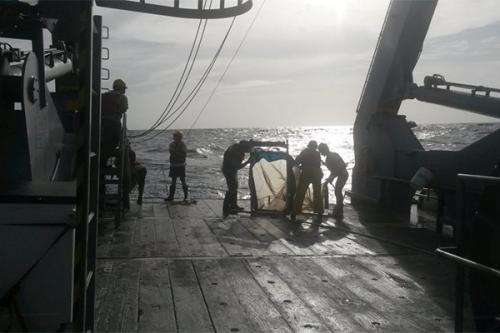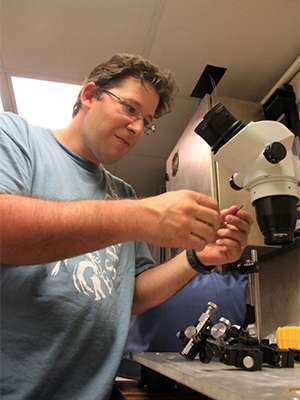Marine biologist examining deep-sea vision on cruise to Barbados, Bahamas

At the depths of the ocean where sunlight gradually fades, crustaceans are specially adapted to see in dim environments. Bring them up to the surface, however, and their sensitive eyes can be damaged—or blinded—by bright light.
That poses a problem for researchers trying to study deep-sea vision. Jonathan Cohen, assistant professor of marine biosciences in the University of Delaware's College of Earth, Ocean, and Environment, uses special techniques to examine the eyesight of small, shrimp-like crustaceans, called copepods, that are an important food source for fish.
Catching copepods from depths of up to a half-mile, Cohen takes care to keep the animals in the dark as he transfers them to a shipboard lab: a 3-by-3-foot enclosure with red lighting, not unlike a miniature darkroom. Material cushions against ship vibrations as Cohen checks the tiny eyes of copepods that are only a few millimeters long, all while working on a rocking boat.
"It takes a lot of practice, and it's hard to do on a moving ship," he said.
Cohen took his scientific setup aboard the research vessel Atlantic Explorer last week for an 11-day cruise from Barbados to Bermuda. The visual ecologist is serving as co-chief scientist on the UNOLS Chief Scientist Training Cruise through June 9, which helps early-career marine researchers learn how to manage multidisciplinary expeditions at sea.

While Cohen has been on numerous research cruises in the past, including a recent test of the new Alvin submersible, he seeks to gain more field experience in a leadership role. Supported by the National Science Foundation, the cruise includes an on-board workshop in ship logistics, from scheduling experiments to coordinating with the crew. The team will conduct ship-to-shore lessons with schools, and the cruise's progress can be followed on this blog.
"The advantage of the cruise is that it creates a learning opportunity for cruise management, but it's also a research and networking opportunity," Cohen said.
In all, 17 scientists from California to Maine will be examining various oceanographic subjects and stopping at eight sampling stations along the way. Some study oil-eating bacteria, while others are investigate ocean chemistry, deep-sea camouflage and plankton shells.
In addition to management responsibilities, Cohen will focus on the visual function of deep-sea copepods that have unusually complex eyes. He is trying to understand how quickly their visual systems can capture light, which may provide insight into predator-prey and mating dynamics.
Cohen will use 100-millisecond flashes for his vision tests, and an electrophysiological apparatus will tell how much light the copepods need in order to see and what wavelengths they can detect. Based on that he hopes to interpret how the organisms see light in their habitats, such whether they catch bioluminescent flashes quickly or their eyes are set up to maximize use of minimal sunlight.
Other researchers have taken a similar approach with large shrimp and crabs, but Cohen scaled the research techniques down to small amphipods and copepods—which are an abundant food source for fish in the deep sea.
Copepods come up to shallow water at night and migrate deeper down during the day. Cohen suspects they use their eyes in some way to drive that vertical migration. The oceanographic phenomenon moves food up and down for fish to take advantage of, and scientists want to understand the behavior of these organisms, which are important to the food web.
"Understanding these migrations is really a big oceanographic question," Cohen said.
Provided by University of Delaware

















